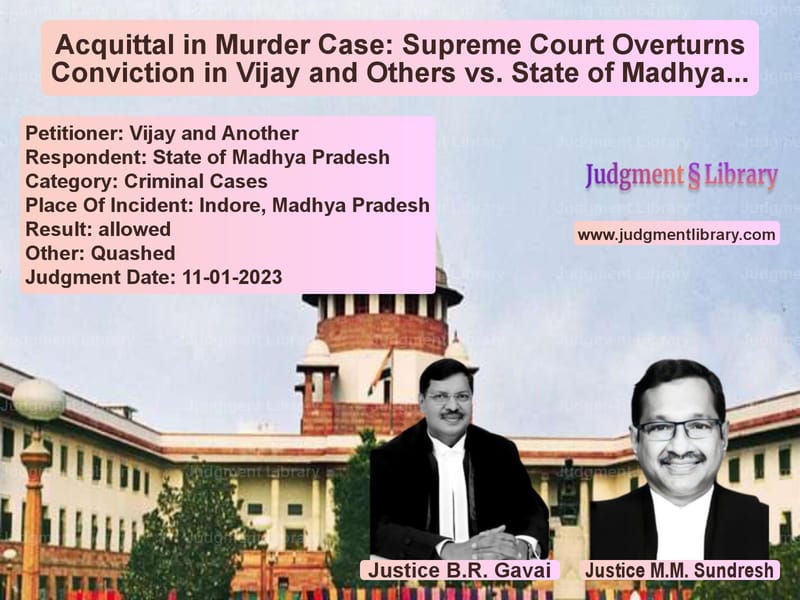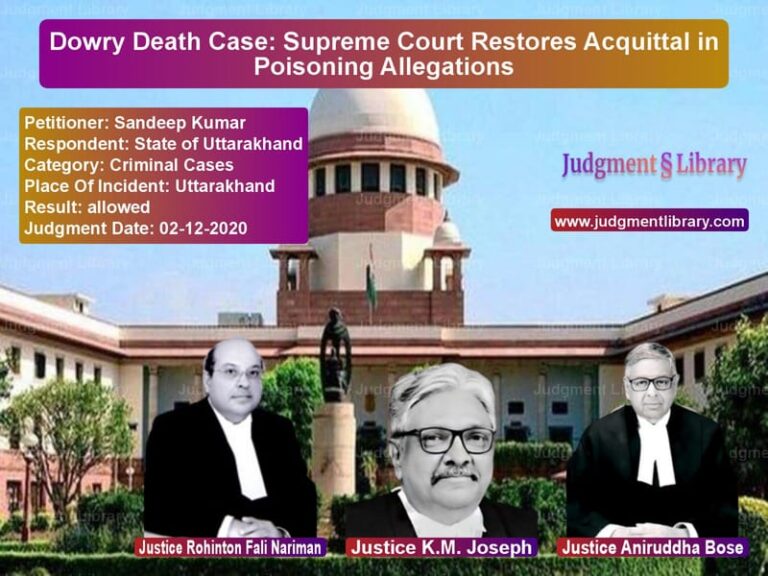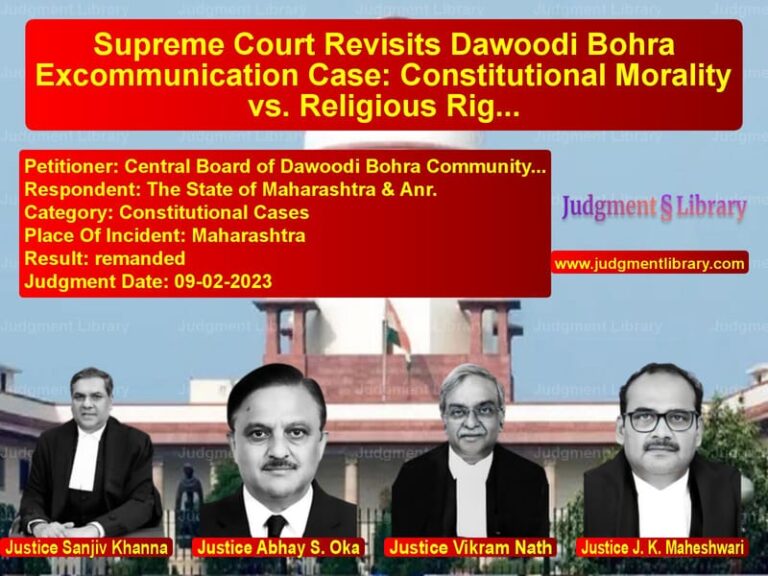Acquittal in Murder Case: Supreme Court Overturns Conviction in Vijay and Others vs. State of Madhya Pradesh
The Supreme Court of India recently delivered a significant judgment in the case of Vijay and Another vs. State of Madhya Pradesh. This case revolves around a brutal murder in Meghdoot Garden, Indore, in 1998. Initially, the accused were convicted and sentenced to life imprisonment by the Trial Court, and the conviction was later upheld by the Madhya Pradesh High Court. However, the Supreme Court, upon reviewing the evidence, found discrepancies in witness testimonies and ultimately acquitted the accused.
Background of the Case
The incident took place on August 2, 1998, when Dharmendra, the son of the complainant Prem Narain (PW-5), was murdered in Meghdoot Garden. According to the prosecution, three accused individuals – Vijay, Babbu @ Nandkishore, and Mahesh – attacked Dharmendra with knives, causing multiple stab wounds. The murder was allegedly motivated by an earlier dispute, wherein the accused had a history of enmity with the victim’s family.
Following the incident, an FIR was registered under Sections 302/34 of the Indian Penal Code (IPC), and the accused were arrested. The prosecution relied heavily on the testimony of the complainant, who claimed to have witnessed the murder. The Trial Court convicted the accused, sentencing them to life imprisonment. The Madhya Pradesh High Court later upheld the conviction in 2008.
The accused then filed an appeal before the Supreme Court, challenging their conviction on the grounds of unreliable witness testimony and lack of substantial evidence.
Arguments by the Appellants
- The conviction was based solely on the testimony of Prem Narain (PW-5), the father of the deceased, which was riddled with contradictions.
- Other eyewitnesses, including police constables and security personnel at Meghdoot Garden, failed to support the prosecution’s case.
- The alleged murder took place in an area with poor visibility, making it questionable whether the complainant could have accurately identified the accused.
- Previous enmity between the victim’s family and the accused created a possibility of false implication.
- Many key prosecution witnesses turned hostile or failed to provide credible statements.
Arguments by the Respondent
- The prosecution maintained that the testimony of Prem Narain (PW-5) was sufficient to convict the accused.
- Both the Trial Court and High Court had found the complainant’s testimony credible.
- The accused had a clear motive for the murder, given their past enmity with the victim.
- The forensic evidence, including blood-stained clothes and weapons recovered from the accused, supported the prosecution’s case.
Supreme Court’s Observations
- “No doubt, that the conviction can be based on the evidence of a solitary witness. However, for resting the conviction on the basis of such testimony, the evidence of such a witness has to be found to be wholly trustworthy, reliable, and cogent.”
- “Prem Narain (PW-5) has admitted to the previous enmity between his family and the accused persons. As held by this Court in a catena of judgments, previous enmity is a double-edged weapon. On one hand, it provides motive, and on the other hand, the possibility of false implication cannot be ruled out.”
- “There were material contradictions in the testimony of Prem Narain (PW-5). From the tenor of the evidence, it is doubtful as to whether he has really witnessed the alleged incident or not.”
- “No light source was available in the area where the murder took place, raising concerns about the identification of the accused.”
- “Several key prosecution witnesses, including independent eyewitnesses, did not support the prosecution’s version of events.”
Final Judgment
- The Supreme Court set aside the conviction and sentence of the accused, granting them the benefit of the doubt.
- The Court ruled that the prosecution failed to establish the guilt of the accused beyond a reasonable doubt.
- The accused were acquitted, and their bail bonds were discharged.
Legal Precedents Considered
- Dilip vs. State of Madhya Pradesh (2022): Emphasized that conviction based on a solitary witness must be wholly reliable and free from contradictions.
- Ganpat vs. State of Rajasthan (2019): Highlighted that previous enmity should not lead to an automatic assumption of guilt.
- Kali Ram vs. State of Himachal Pradesh (1973): Stressed that benefit of the doubt should be given when the prosecution’s case has inconsistencies.
Implications of the Judgment
- The ruling underscores the importance of credible witness testimony in criminal cases.
- It reinforces the principle that mere suspicion or motive is insufficient for conviction.
- It sets a precedent that courts must carefully evaluate witness credibility, particularly in cases with previous enmity.
- The judgment highlights the necessity of corroborative evidence in serious criminal cases.
Conclusion
The Supreme Court’s decision in this case reaffirms the fundamental principle that no individual should be convicted unless their guilt is proven beyond a reasonable doubt. The ruling serves as an important reminder of the judiciary’s role in ensuring that convictions are based on reliable evidence rather than assumptions or previous enmity. The case also sheds light on the crucial role of witness credibility in criminal trials and the need for meticulous scrutiny of evidence to prevent miscarriages of justice.
Read also: https://judgmentlibrary.com/dying-declaration-in-dowry-death-case-supreme-court-acquits-husband/
Petitioner Name: Vijay and Another.Respondent Name: State of Madhya Pradesh.Judgment By: Justice B.R. Gavai, Justice M.M. Sundresh.Place Of Incident: Indore, Madhya Pradesh.Judgment Date: 11-01-2023.
Don’t miss out on the full details! Download the complete judgment in PDF format below and gain valuable insights instantly!
Download Judgment: vijay-and-another-vs-state-of-madhya-prad-supreme-court-of-india-judgment-dated-11-01-2023.pdf
Directly Download Judgment: Directly download this Judgment
See all petitions in Murder Cases
See all petitions in Bail and Anticipatory Bail
See all petitions in Judgment by B R Gavai
See all petitions in Judgment by M.M. Sundresh
See all petitions in allowed
See all petitions in Quashed
See all petitions in supreme court of India judgments January 2023
See all petitions in 2023 judgments
See all posts in Criminal Cases Category
See all allowed petitions in Criminal Cases Category
See all Dismissed petitions in Criminal Cases Category
See all partially allowed petitions in Criminal Cases Category







